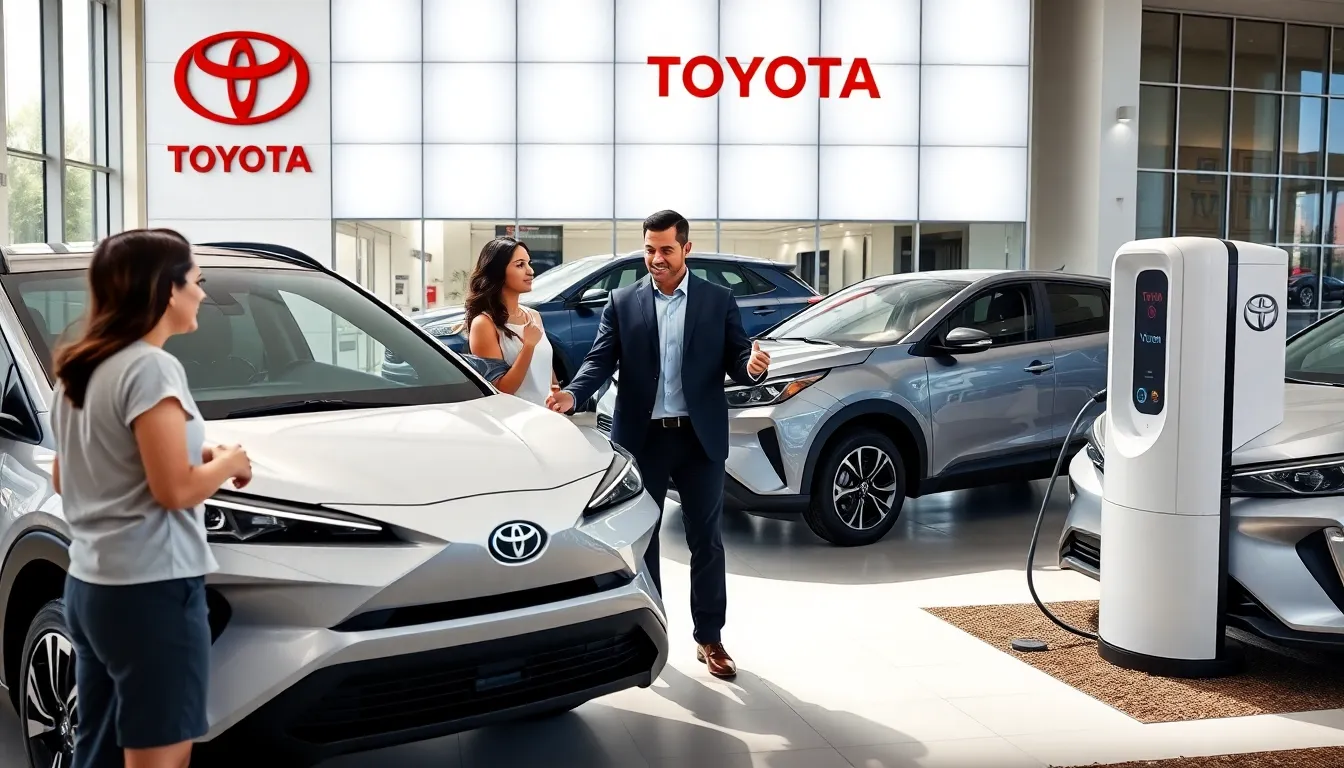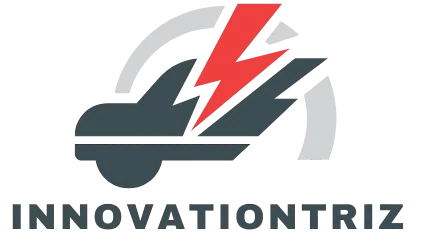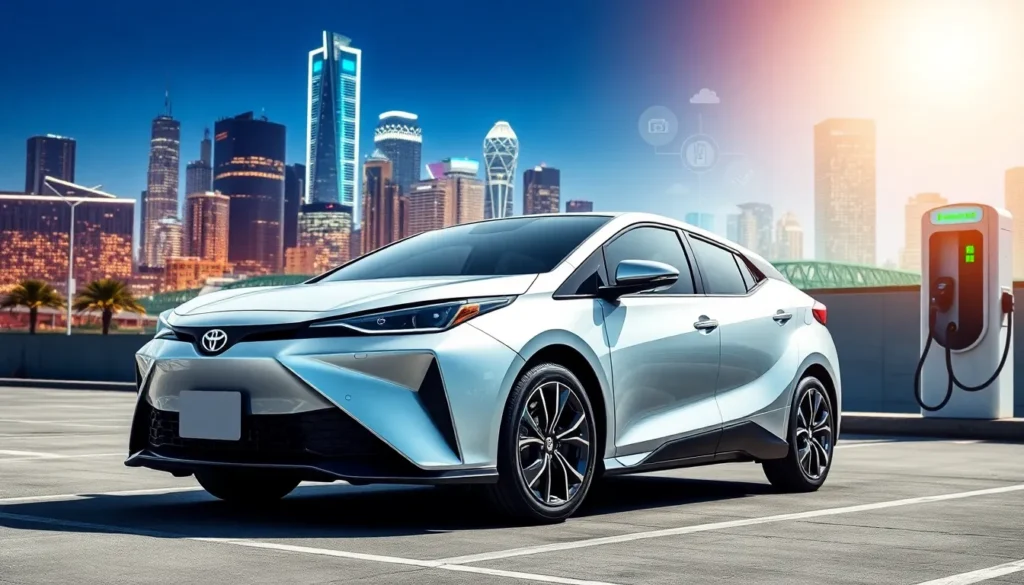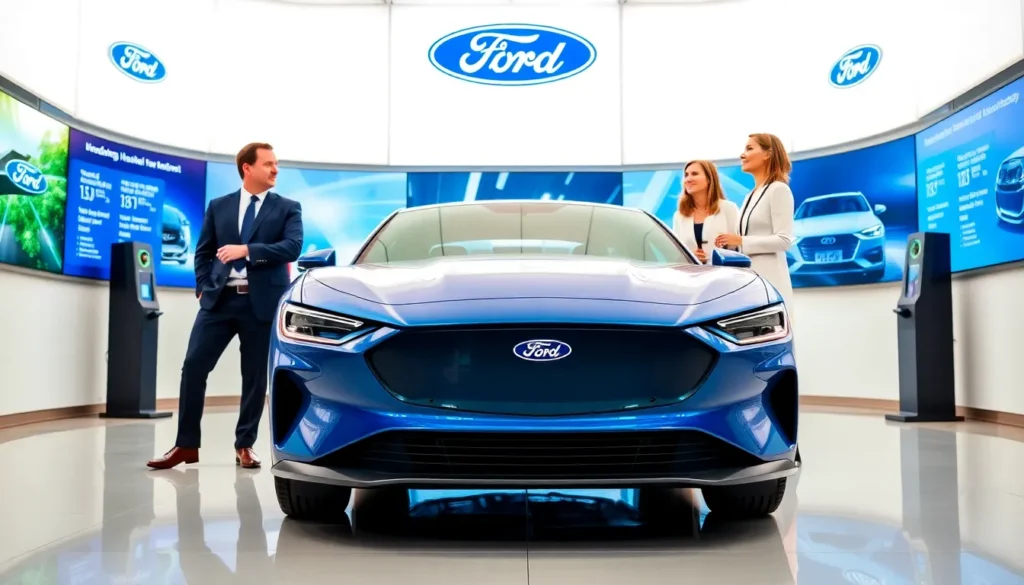Table of Contents
ToggleImagine cruising down the highway in a car that not only reduces your carbon footprint but also makes you feel like you’re piloting the latest spaceship. Welcome to the world of Toyota electric vehicles. As the automaker revs up its electric ambitions, drivers can expect a future filled with innovation, sustainability, and perhaps a hint of fun that traditional vehicles just can’t offer. This article dives into Toyota’s electric journey, highlighting their strategies, features, and how they plan to revolutionize your drive.
Overview of Toyota’s Electric Vehicle Strategy

Toyota has long been a pioneer in the automotive world, and now it’s steering into the electric horizon with ambition. Their strategy revolves around a multi-faceted approach to electrification, aiming for a mix of hybrids, plug-in hybrids, and fully electric vehicles (EVs). With plans to invest heavily in battery technologies, Toyota intends to launch a slew of new models in the coming years. The automaker’s executives have been vocal about their goal to achieve net-zero carbon emissions by 2050. By partnering with various stakeholders, including other manufacturers and tech companies, Toyota is poised to lead in the electrification race. Gone are the days when electric vehicles were merely seen as a trend: they are the future, and Toyota is ready to help define that future.
Key Features of New Toyota Electric Models
The new Toyota electric vehicles come packed with features that make them both practical and stylish. First and foremost, they emphasize range, with some models boasting up to 400 miles on a single charge, perfect for road trips without the dreaded range anxiety. Also, these vehicles sport sleek, modern designs that appeal to various tastes, ensuring no one feels left out behind the wheel.
Another exciting feature is the advanced safety technologies, including Toyota Safety Sense, which incorporates adaptive cruise control, lane departure alerts, and automatic emergency braking. Plus, with integrated infotainment systems, drivers can easily connect their devices and enjoy seamless navigation.
And let’s not forget about charging. Many new Toyota EVs will enable fast charging capabilities, allowing users to power up their cars quickly at charging stations, making it almost as convenient as filling up at a gas pump. All of these elements combine to create an electric experience that appeals to both seasoned eco-warriors and those new to the electric vehicle conversation.
Popular Toyota Electric Vehicles in 2025
As Toyota rolls out its new electric models, several are capturing the spotlight in 2025. The Toyota bZ4X, their flagship model, is an all-electric SUV that has gained significant attention for its impressive design and tech features. With ample cargo space and a sophisticated all-wheel-drive system, it’s no wonder this vehicle is a top choice for families who prioritize sustainability without sacrificing comfort.
Next, make way for the Toyota Corolla Electric. This classic nameplate is being reimagined in electric form, combining familiarity with modern appeal. Its compact size coupled with efficiency makes it an ideal choice for city dwellers.
Finally, the upcoming Toyota Hilux EV stands out for those seeking a reliable electric truck. With impressive towing capabilities and rugged durability, it’s poised to attract adventure enthusiasts looking for an eco-friendly alternative to traditional pickup trucks.
Sustainability Initiatives and Environmental Impact
Toyota’s commitment to sustainability goes beyond just producing electric vehicles. The automaker is heavily involved in promoting sustainable manufacturing processes, utilizing eco-friendly materials, and striving for zero waste in its production facilities. By 2030, Toyota plans to have a wide array of vehicles that are both electric and environmentally friendly.
Plus to minimizing the carbon footprint during manufacturing, Toyota is investing in global recycling programs. These initiatives ensure that once a vehicle reaches the end of its life, valuable components can be reused, leading to a circular economy.
Also, Toyota’s support for renewable energy sources to power its production plants signifies a profound dedication to reducing its environmental impact. The result? Cleaner air, a healthier planet, and a commitment to leaving a legacy of sustainability.
Technological Innovations in Toyota Electric Vehicles
When it comes to technology, Toyota isn’t just keeping pace: they’re setting the standard. Their electric vehicles will incorporate cutting-edge technology, including artificial intelligence and autonomous driving capabilities. This tech aims to enhance the driving experience while ensuring safety and efficiency.
Battery technology is another frontier where Toyota shines. The company is developing solid-state batteries, which promise greater energy density and faster charging times compared to conventional lithium-ion batteries. This innovation could significantly enhance the driving range of electric vehicles while reducing recharge times to mere minutes.
Besides, the integration of smart features into Toyota’s electric models, such as vehicle-to-home technology, allows owners to harness their car’s battery to power their homes during emergencies, showcasing the practical benefits of innovative tech.
Customer Insights and Market Reception
As Toyota unveils its range of electric vehicles, market reception has been largely positive. Surveys indicate that potential buyers appreciate Toyota’s longstanding reputation for reliability, which translates into confidence when considering an electric option. Many consumers are particularly excited about the blend of technology and sustainability in Toyota’s offerings.
Social media buzz highlights reviews praising the bZ4X for its spacious interior and electric performance. Early adopters frequently mention the convenience of charging options in urban areas, which directly impacts their purchasing decisions. Feedback suggests that while some still have concerns about range and charging infrastructure, the introduction of Toyota’s electric lineup is paving the way for broader acceptance of electric vehicles.
But, as with any major transition, it’s essential for Toyota to continue listening to consumer desires. By adapting features based on feedback, the brand can ensure a loyal customer base eager to embrace the electric revolution.




